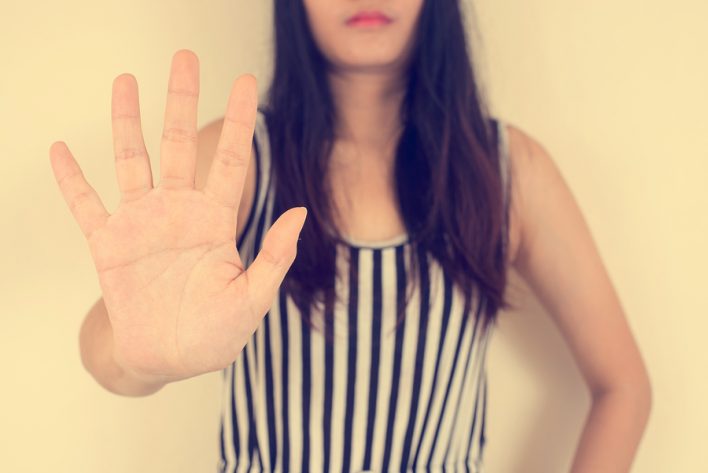Advice
The path to healing after sexual abuse
By: Lorraine Hackett
Updated: 01 September 2016

Sexual abuse can leave the victim feeling helpless, alone, and scared.
Some victims of sexual assault, abuse and harassment may keep the abuse hidden, fearing blame, judgement or unwanted pity. They may fear that people will look at them differently or treat them in a certain way.
This understandable fear can be a significant barrier to breaking the wall of silence and starting the healing process.
MyMind has team members who can help with this journey. We want to empower you to take your own steps to overcome these emotional and mental barrier.
If you have experienced or are living with sexual abuse, please, please do get in touch with us. Call our team at 076 680 1060 or email hq@mymind.org. Alternatively, you can book an appointment online here.
You don’t have to try to heal alone.
The Dublin Rape Crisis Centre says, “No matter how great the victim's difficulty in coping with the assault, it does not mean that s/he has developed serious or permanent psychiatric or emotional problems. The victim of sexual violence can and do recover and reclaim their lives.”
If a loved one has been sexually abused or assaulted, it’s very hard to know what to do.
The Dublin Rape Crisis Centre has some suggestions on how you can help.
You have an important role to play in helping the person who has been sexually assaulted or raped in his or her recovery. You can give the same comfort and support you would give to anyone in crisis, be it due to a bereavement, an illness, or a sexual assault or rape.
- The victim may have many difficult feelings -rage, helplessness, fear, guilt, anxiety, depression etc. It will be helpful to have somebody s/he can trust to listen as the feelings emerge. Don’t try to make him or her ‘forget about it’. Let him or her talk, if s/he needs to, without probing for details.
- Be aware that the victim may find it difficult to talk, or may not always wish to talk. Try to be open and available without placing him or her under pressure. Let him or her know about the support available from an RCC without pressure.
- Reassure him or her of your belief and support, that the assault was not their fault, and that people care about them. Understand that it can be very painful and difficult to talk about what happened.
- On a practical level you may be able to offer help with everyday tasks which the victim may find difficult to cope with and offer support in his or her attempts to resume a normal life. Other practical support might include accompanying him or her to the doctor, the Gardaí or to court.
- Rape and sexual assault can affect a victim’s feelings about sexuality. This may, for a time, impact on intimate relationships, and sensitivity to this from a partner will be very helpful.
- Be aware that helping someone you love to cope with the impact of rape or sexual assault will take a toll on you as well. You may need to talk to somebody about your own feelings and concerns.
- Remember, it may take some time for the victim to recover from the experience. Try not to put pressure on him or her to get back to normal before s/he is ready or able. You can be there as practical support as they take each small step back to wellness.
MENTAL HEALTH PROFESSIONALS WORKING WITH Trauma ISSUES:
Approach: Cognitive Behavioural Therapy (CBT) , Humanistic & Integrative Psychotherapy , Mindfulness , Solution-Focused Brief Therapy
Works with: Individual Session , Children & Adolescents
Specialities: Anger , Anxiety , Bereavement / Loss , Depression , Relationship issues , Self-Esteem , Stress , Trauma
Next avaialble appointment: 19:00 29 January 2025
Approach: Cognitive Behavioural Therapy (CBT)
Works with: Individual Session , Couples
Specialities: Addiction , Anger , Anxiety , Bereavement / Loss , Depression , Personal Development , Relationship issues , Self-Esteem , Stress , Trauma
Next avaialble appointment: 16:00 29 January 2025
Approach: Humanistic & Integrative Psychotherapy , Cognitive Behavioural Therapy (CBT) , Person-Centred Therapy , Other
Works with: Individual Session , Couples
Specialities: Addiction , Anger , Domestic Violence / Abuse , Eating Disorder / Body Image , Fertility , Isolation / Loneliness , Neurodiversity , Obsessive Compulsive Disorder , Personal Development , Personality disorder , Relationship issues , Self-Esteem , Sexuality (LGBTQIA+) , Stress , Trauma , Work Issues, Work/Life balance , Other
Next avaialble appointment: 9:00 30 January 2025
NEXT ARTICLE
Combatting insecurities in your relationship
Search
Get The Support You Need
From One Of Our Counselors
News
Isolation
Anxiety
Depression
Relationship Issues
Counselling
Personality Disorder
Addiction
Trauma
Children and Adolescent
Anger
Bereavement
Chronic Illness
Communication Issues
Eating Disorder
Post natal depression
Stress
LGBTQI+
Panic Attack
OCD
Resilience
Parental support
Men's Mental Health
Category List
All Posts
News
Isolation
Anxiety
Depression
Relationship Issues
Counselling
Personality Disorder
Addiction
Trauma
Children and Adolescent
Anger
Bereavement
Chronic Illness
Communication Issues
Eating Disorder
Post natal depression
Stress
LGBTQI+
Panic Attack
OCD
Resilience
Parental support
Men's Mental Health

